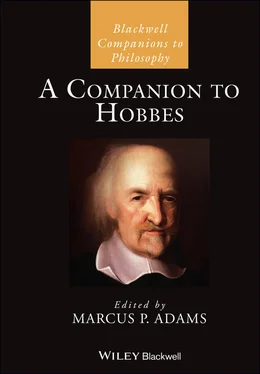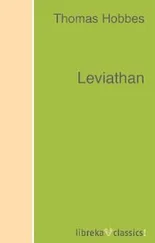20 20 Jesseph (2016) explores the roles played by endeavor in different parts of Hobbes’s philosophy.
Part I First Philosophy, Mathematics, and Natural Philosophy
1 Hobbes’s Unified Method for Scientia
HELEN HATTAB
Hobbes locates the study of humans within the natural world. Not just our physical actions, but our passions, our desires, our willings and to a certain extent, our thoughts and deliberations, are determined by the same natural laws as everything else. To the degree that there is human freedom, it cannot involve actions that lie outside the deterministic course of nature. Hobbes was decried as a radical thinker in his day and is still considered a materialist atheist. A major source of resistance to his philosophy stemmed from the implications of his theory of human nature for the foundations of ethics and politics. How can we be held to moral laws without a personal divinity to hand these down, punish, and reward us, and without free will to overcome the animal drives nature determines in us? How can we secure political authority and stability if the right to govern does not derive from a providential God? Hobbes has an ingenious solution to this problem which is well-studied. If you know anything about Hobbes, you probably know that he was an early proponent of the social contract theory of government. On this theory, political authority derives from the voluntary transfer of the power each person has, by natural law, to preserve and protect his or her life to a commonly recognized sovereign. Hobbes’s political theory influenced Benedict de Spinoza, John Locke, and beyond, and his contribution to politics is well researched. Less well-studied is the relationship between Hobbes’s view of natural science and his political theory. A major source of confusion lies in his formal presentation of his philosophical and scientific method. Though Hobbes claims that it generates both types of knowledge, his works on physics and politics seem to employ different methods. This chapter examines the role and nature of Hobbes’s method for science in its historical context to clarify how his theoretical and practical philosophy are unified.
1.1 Method, Science, and Hobbes’s Project
Hobbes’s politics is commonly studied independently of his method and science. This is odd because, despite writing political works that can be read independently, Hobbes claims in the preface to his comprehensive work, Elements of Philosophy (EW I.viii-xi) to be the first to develop a scientia civilis (civil science), boasting that by securing true foundations, he has done the same for moral and political philosophy as Galileo Galilei did for physics and William Harvey for medicine. In the previously published preface to De cive (EW II.x-xi), Hobbes traces the source of all contention and bloodshed to the absence of a scientific foundation for morals among predecessors, a point he repeats in De corpore , Part I of his Elements : “therefore, from the not knowing of civil duties, that is from the want of moral science, proceed civil wars, and the greatest calamities of mankind” (EW I.10). To illustrate the source of prior philosophers’ failure to provide this foundation, Hobbes likens the traditional justification of political authority by appeal to the divine to the ancient fable in which Ixion, a mortal, embraces the goddess Juno (EW II.xiii). His point is that past philosophical attempts to marry human judgments and apprehensions about justice to the divine are illusory. This approach can only beget empty, inconsistent opinions that produce political instability and bloodshed.
In his Dedication of De corpore to the Earl of Devonshire, Hobbes employs another analogy to make a similar point about Scholastic Aristotelian philosophy, characterizing it as the Empusa of the Athenian comic poet: “there entered a thing called school divinity , walking on one foot firmly, which is Holy Scripture, but halted on the other rotten foot, which the Apostle Paul called vain , and might have called pernicious philosophy ” (EW I.xi). Hobbes proposes to exorcise this monster by distinguishing
between the rules of religion, that is, the rules of honoring God, which we have from the laws, and the rules of philosophy, that is, the opinions of private men; and to yield what is due to religion to the Holy Scripture, and what is due to philosophy to natural reason. And this I shall do, if I but handle the Elements of Philosophy truly and clearly, as I endeavor to do.
(EW I.x–xi)
He then announces the aim of this work:
I intend now, by putting into a clear method the true foundations of natural philosophy, to fright and drive away this metaphysical Empusa ; not by skirmish, but by letting in the light upon her.
(EW I.xi)
To build a political structure that will prove stable and lasting, one first requires true foundations of natural philosophy. These are to be treated methodically, unadulterated by the mixing in of myths, fables, and religious writings. From the start, Hobbes presents his new moral and civil science as dependent on the true foundations his method provides for natural philosophy. Method is crucial to Hobbes’s project.
Hobbes’s purging of the non-natural from philosophy in order to base practical philosophy on the scientific foundations of natural philosophy does not imply that he rejects all religion and theology – note that the rotten foot is the philosophical one! Rather his colorful analogies trace the lack of progress in practical philosophy to the intermingling of philosophy and religion. A methodical treatment of the true foundations of natural philosophy required for a moral science thus necessitates that one first cordon off the domain of philosophical activity, which De corpore ’s Epistle to the Reader describes as “the natural reason of man, busily flying up and down among the creatures, and bringing back a true report of their order, causes and effects” (EW I.xiii). Fencing in natural reason prevents it from encroaching on and contaminating neighboring territories. The goal is not to obliterate religion, but to confine philosophy to what Hobbes regards as its proper domain, and thus to contain and purify both. He even suggests that philosophy (which, like René Descartes, he takes to reside confusedly within us) requires a method that keeps the contemplative order separate but parallel to the order of creation. 1
Hobbes’s characterizations of his project, reveal that his formal definition is designed to put Philosophy, and its practitioners, in their place. Philosophy is,
such knowledge of effects or appearances, as we acquire by true ratiocination from the knowledge we have first of their causes or generation: And again of such causes and generations as may be from knowing their first effects.
(EW I.2)
As Hobbes acknowledges afterward, this is a narrower definition than was typical of contemporaneous philosophers. It also equates natural reasoning with ratiocination, which Hobbes characterizes narrowly as computation, a mental composition and resolution of conceptual units which I discuss in the final section. Armed with his definition Hobbes deduces from it that the subject of philosophy is delimited to,
every body of which we can conceive any generation, and which we may, by any consideration thereof, compare with other bodies, or which is capable of composition and resolution; that is to say, every body of whose generation or properties we can have any knowledge.
(EW I.10)
Philosophy, and its activity of ratiocination, is thus confined to the domain of material things. Angels, being immaterial, are excluded, as is Theology, since God is unchanging and eternal. The narrowing of natural reasoning to computation also excludes subjects that rely on other forms of knowing from the domain of Philosophy. Hobbes thus rules history, revealed knowledge, doubtful doctrines like astrology, as well as the doctrine of God’s worship out of bounds (EW I.10–11).
Читать дальше












